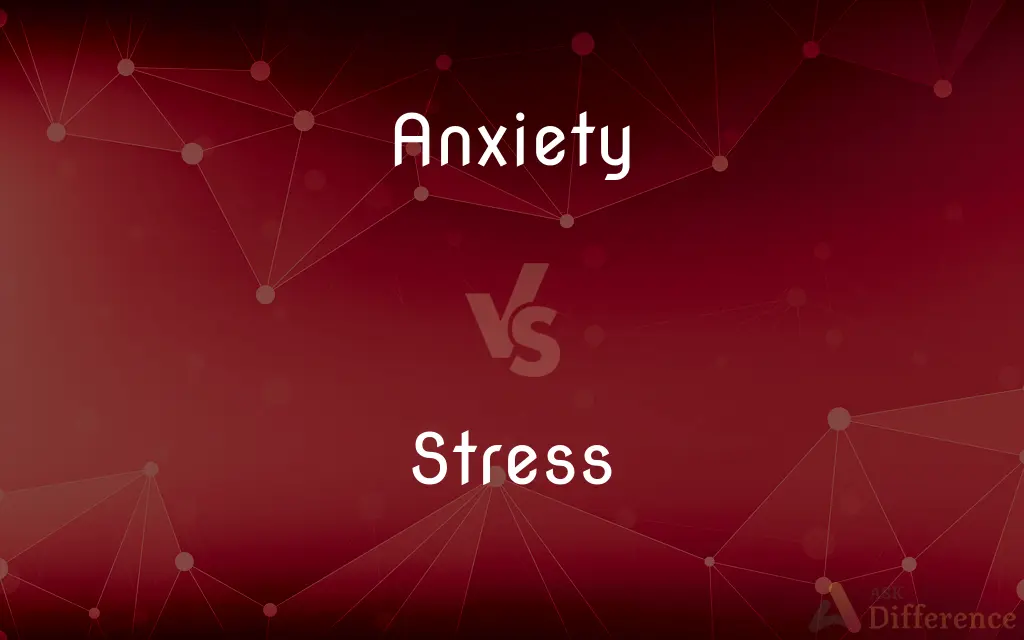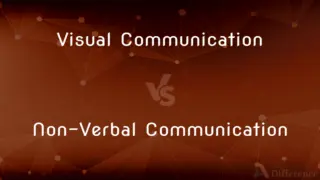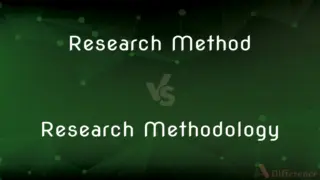Anxiety vs. Stress — What's the Difference?
Edited by Tayyaba Rehman — By Fiza Rafique — Published on October 1, 2023
Anxiety is a prolonged feeling of unease or fear, often without a clear cause, while stress is a reaction to a specific external pressure or threat.

Difference Between Anxiety and Stress
Table of Contents
ADVERTISEMENT
Key Differences
Anxiety and stress are both emotional responses, but they originate from different catalysts. Anxiety primarily manifests as a persistent sense of fear, worry, or unease, even when no immediate threat is present. In contrast, stress is directly linked to specific external challenges or pressures, acting as the body's way to cope with demands or threats.
Differentiating the two further, anxiety tends to be more chronic and may not have an identifiable source. One might feel anxious without knowing exactly why, leading to a perpetual state of apprehension. Stress, however, often has a clear trigger, such as an upcoming exam, a work deadline, or personal conflicts, making its source more discernible.
In terms of physical reactions, anxiety might produce symptoms like rapid heartbeat, excessive sweating, or trembling. These symptoms occur due to the body's "fight or flight" response, which is activated, but often without a clear reason. Stress also triggers the "fight or flight" response, but typically due to identifiable external challenges, leading to similar yet more context-specific symptoms.
Lastly, while both anxiety and stress can be harmful when prolonged or intense, they're also natural human reactions. The key difference remains that anxiety often lacks a clear reason, while stress usually has a direct cause.
Comparison Chart
Definition
Prolonged feeling of unease or fear
Reaction to a specific external pressure or threat
ADVERTISEMENT
Source
Often unclear or internal
Usually external and identifiable
Duration
Tends to be chronic
Can be short-term or long-term based on the cause
Symptoms
Rapid heartbeat, trembling, unease
Similar symptoms but tied to the specific cause
Management
Cognitive therapy, medication
Time management, relaxation techniques
Compare with Definitions
Anxiety
A feeling of unease, such as worry or fear.
Her anxiety grew as the date of the interview approached.
Stress
Strain or tension resulting from adverse situations.
The stress of moving to a new city was overwhelming.
Anxiety
Apprehension without an apparent cause.
Even with no exam scheduled, he felt a constant anxiety.
Stress
A specific pressure or demand on one's body or mind.
The stress of the deadline was making him irritable.
Anxiety
Intense eagerness or concern.
Her anxiety to perform well made her practice daily.
Stress
Emphasis in speech or writing.
He put stress on the importance of timeliness.
Anxiety
A nervous disorder causing excessive uneasiness.
Diagnosed with generalized anxiety disorder, she sought therapy.
Stress
Importance, significance, or emphasis placed on something.
Anxiety
An anxious feeling about a particular situation.
The unknown outcome created much anxiety.
Stress
The relative force with which a sound or syllable is spoken.
Anxiety
A state of uneasiness and apprehension, as about future uncertainties.
Stress
The emphasis placed on the sound or syllable spoken most forcefully in a word or phrase.
Anxiety
A cause of anxiety
For some people, air travel is a real anxiety.
Stress
The relative force of sound or emphasis given a syllable or word in accordance with a metrical pattern.
Anxiety
(Psychology) A state of apprehension, uncertainty, and fear focused on the anticipation of a realistic or fantasized threatening event or situation, often impairing physical and psychological functioning.
Stress
A syllable having strong relative emphasis in a metrical pattern.
Anxiety
Eager, often agitated desire
My anxiety to make a good impression.
Stress
An accent or mark representing such emphasis or force.
Anxiety
An unpleasant state of mental uneasiness, nervousness, apprehension and obsession or concern about some uncertain event.
Stress
The internal distribution of force per unit area within a body subject to an applied force or system of forces.
Anxiety
An uneasy or distressing desire (for something).
Stress
The internal resistance of a body to such an applied force or system of forces.
Anxiety
(pathology) A state of restlessness and agitation, often accompanied by a distressing sense of oppression or tightness in the stomach.
Stress
A condition of extreme difficulty, pressure, or strain
"He presided over the economy during the period of its greatest stress and danger" (Robert J. Samuelson).
Anxiety
Concern or solicitude respecting some thing or event, future or uncertain, which disturbs the mind, and keeps it in a state of painful uneasiness.
Stress
A condition of physiological or psychological disturbance to the normal functioning or well-being of an organism, occurring as a response to any of various environmental or psychosocial stimuli. Signs and symptoms of stress in humans include increased blood pressure, insomnia, and irritability.
Anxiety
Eager desire.
Stress
A stimulus or circumstance causing such a condition
Couldn't stand the stresses of the job and quit.
Anxiety
A state of restlessness and agitation, often with general indisposition and a distressing sense of oppression at the epigastrium.
Stress
To place emphasis on
Stressed basic fire safety in her talk.
Anxiety
A relatively permanent state of anxiety occurring in a variety of mental disorders
Stress
To give prominence of sound to (a syllable or word) in pronouncing or in accordance with a metrical pattern.
Anxiety
A vague unpleasant emotion that is experienced in anticipation of some (usually ill-defined) misfortune
Stress
(Informal) To subject to physiological or mental stress or strain. Often used with out
The pressure of the deadline is really stressing me out.
Stress
To subject to mechanical pressure or force.
Stress
To undergo physiological or mental stress, as from working too much. Often used with out.
Stress
(biology) A physical, chemical, infective agent aggressing an organism.
Stress
(biology) Aggression toward an organism resulting in a response in an attempt to restore previous conditions.
Stress
The internal distribution of force across a small boundary per unit area of that boundary (pressure) within a body. It causes strain or deformation and is typically symbolised by σ or τ.
Stress
Force externally applied to a body which cause internal stress within the body.
Stress
(uncountable) Emotional pressure suffered by a human being or other animal.
Go easy on him, he's been under a lot of stress lately.
Stress
A suprasegmental feature of a language having additional attention raised to a sound, word or word group by means of of loudness, duration or pitch; phonological prominence.
Some people put the stress on the first syllable of “controversy”; others put it on the second.
Stress
The suprasegmental feature of a language having additional attention raised to a sound by means of of loudness and/or duration; phonological prominence phonetically achieved by means of dynamics as distinct from pitch.
Stress
(uncountable) Emphasis placed on a particular point in an argument or discussion (whether spoken or written).
Stress
Obsolete form of distress
Stress
Distress; the act of distraining; also, the thing distrained.
Stress
(transitive) To apply force to (a body or structure) causing strain.
Stress
(transitive) To apply emotional pressure to (a person or animal).
Stress
To suffer stress; to worry or be agitated.
Stress
(transitive) To emphasise (a syllable of a word).
“Emphasis” is stressed on the first syllable, but “emphatic” is stressed on the second.
Stress
(transitive) To emphasise (words in speaking).
Stress
(transitive) To emphasise (a point) in an argument or discussion.
I must stress that this information is given in strict confidence.
Stress
Distress.
Sad hersal of his heavy stress.
Stress
Pressure, strain; - used chiefly of immaterial things; except in mechanics; hence, urgency; importance; weight; significance.
The faculties of the mind are improved by exercise, yet they must not be put to a stress beyond their strength.
A body may as well lay too little as too much stress upon a dream.
Stress
The force, or combination of forces, which produces a strain; force exerted in any direction or manner between contiguous bodies, or parts of bodies, and taking specific names according to its direction, or mode of action, as thrust or pressure, pull or tension, shear or tangential stress.
Stress is the mutual action between portions of matter.
Stress
Force of utterance expended upon words or syllables. Stress is in English the chief element in accent and is one of the most important in emphasis. See Guide to pronunciation, 31-35.
Stress
Distress; the act of distraining; also, the thing distrained.
Stress
To press; to urge; to distress; to put to difficulties.
Stress
To subject to stress, pressure, or strain.
Stress
To subject to phonetic stress; to accent.
Stress
To place emphasis on; to make emphatic; emphasize.
Stress
The relative prominence of a syllable or musical note (especially with regard to stress or pitch);
He put the stress on the wrong syllable
Stress
(psychology) a state of mental or emotional strain or suspense;
He suffered from fatigue and emotional tension
Stress is a vasoconstrictor
Stress
(physics) force that produces strain on a physical body;
The intensity of stress is expressed in units of force divided by units of area
Stress
Special emphasis attached to something;
The stress was more on accuracy than on speed
Stress
Difficulty that causes worry or emotional tension;
She endured the stresses and strains of life
He presided over the economy during the period of the greatest stress and danger
Stress
To stress, single out as important;
Dr. Jones emphasizes exercise in addition to a change in diet
Stress
Put stress on; utter with an accent;
In Farsi, you accent the last syllable of each word
Stress
Test the limits of;
You are trying my patience!
Stress
Physical pressure exerted on an object.
The bridge was built to withstand high stress.
Stress
A state of mental or emotional tension.
Financial difficulties can cause a lot of stress.
Common Curiosities
Are there physical symptoms associated with both?
Absolutely, both can cause symptoms like rapid heartbeat, fatigue, and headaches.
What's the primary difference between anxiety and stress?
Anxiety is an ongoing feeling of fear without a clear cause, while stress is a reaction to a specific challenge.
Is it possible to have anxiety without stress?
Yes, people can experience anxiety without any identifiable external stressors.
How do life changes factor into anxiety and stress?
Major life changes, even positive ones, can induce stress and potentially lead to anxiety.
How can one manage anxiety?
Techniques include therapy, medication, mindfulness, and exercise.
Can anxiety arise from stress?
Yes, prolonged or intense stress can lead to feelings of anxiety.
Can animals experience anxiety and stress?
Yes, animals can show signs of distress and behavioral changes when stressed or anxious.
Can stress be positive?
Yes, short-term stress can motivate and improve performance, known as "eustress."
Can anxiety and stress impact physical health?
Yes, chronic anxiety and stress can lead to various health issues.
Are relaxation techniques effective for stress?
Yes, methods like deep breathing and meditation can alleviate stress.
How are anxiety disorders different from everyday anxiety?
Anxiety disorders are intense, prolonged, and interfere with daily life.
Are there different types of stress?
Yes, including acute, episodic acute, and chronic stress.
Do children experience anxiety and stress?
Absolutely, children can feel stress from school and develop anxiety disorders.
Are anxiety and stress always negative?
While they can be harmful, moderate stress can motivate, and anxiety can heighten awareness.
Is it common to experience both anxiety and stress?
Yes, many people experience both, especially during challenging times.
Share Your Discovery

Previous Comparison
Visual Communication vs. Non-Verbal Communication
Next Comparison
Research Method vs. Research MethodologyAuthor Spotlight
Written by
Fiza RafiqueFiza Rafique is a skilled content writer at AskDifference.com, where she meticulously refines and enhances written pieces. Drawing from her vast editorial expertise, Fiza ensures clarity, accuracy, and precision in every article. Passionate about language, she continually seeks to elevate the quality of content for readers worldwide.
Edited by
Tayyaba RehmanTayyaba Rehman is a distinguished writer, currently serving as a primary contributor to askdifference.com. As a researcher in semantics and etymology, Tayyaba's passion for the complexity of languages and their distinctions has found a perfect home on the platform. Tayyaba delves into the intricacies of language, distinguishing between commonly confused words and phrases, thereby providing clarity for readers worldwide.
















































